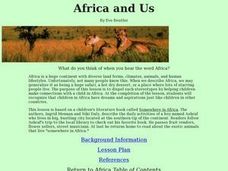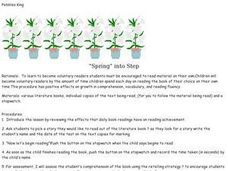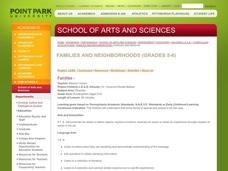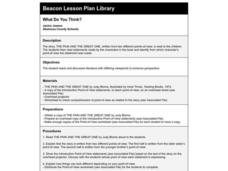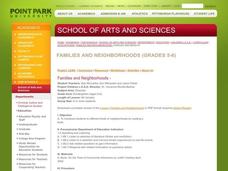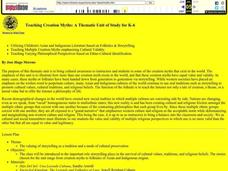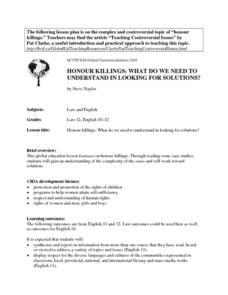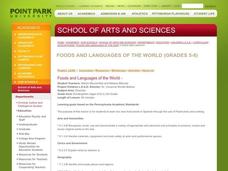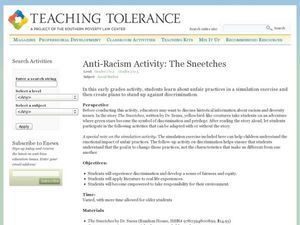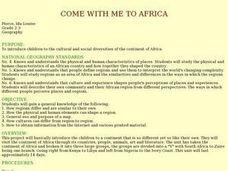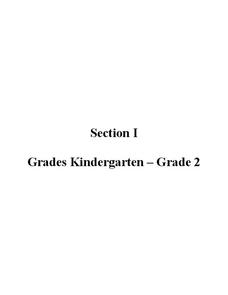Curated OER
Aspects of Participatory Citizenship
Students research the current issues about the government of Canada and develop their presentation skills.
Curated OER
Africa and Us
Students identify places that a child living in South Africa and they themselves might want to visit.
Curated OER
Portrait of The African American Family
Young scholars examine how African American families were affected by slavery. As a class, they watch and read King's "I Have a Dream Speech" and write a paper on how this message relates to families. In their journals, they compare...
Curated OER
"Spring" into Step
Pupils practice the strategy of reading independently to encourage them to read material on their own. They choose a book of their choice to read by themselves to have a positive effect on their comprehension, vocabulary and reading...
Curated OER
Physical Differences
Students role play what it would be like to have a physical disability. In this lesson on acceptance, students listen to the book A Rainbow of Friends by P.K. Hallinan. As a class, the students discuss similarities and differences in...
Curated OER
White Anti-Racist Biographies: Early Grades
Students research white anti racists including Laurie Olsen, Myles Horton, and others. In this anti racist lesson plan, students complete an online treasure hunt where they research these people and fill in the blanks to sentences about...
Curated OER
Families
Students draw a picture of their families and discuss how each is different. In this families lesson plan, students discuss how each family is uniquely different and special in their own way.
Curated OER
Fables Unit Lesson Plan
Students study fables in a broad context. In this literary lesson on fables, students define terms unique to them. Students use a variety of technological resources to gather and classify information into three categories. Students also...
Curated OER
What Do You Think?
Third graders listen to the story, "The pain and the Great One", which is written from two different points of view. They read statements made by the characters in the book and identify from which character's point of view the statement...
Curated OER
The Civil War through a Child's Eye
Students read Paul Fleischman's Bull Run in Readers Theater format. Next, students examine and interpret primary source images of Civil War era students and reveal their understanding of a child's perspective in a literary portrait.
Curated OER
Families and Neighborhoods
Students answer questions about families and what they do together. Students discuss different types of families and draw a picture of their family, discussing similarities and differences in the pictures and in families in general.
Curated OER
Families and neighborhoods
Students create their house to add to a class "neighborhood". In this activity on family and community, students read the book Family by Todd Parr and discuss how all families and houses are different. Then, students create their own...
Curated OER
Families and Neighborhoods
Students investigate the characteristics of a neighborhood. In this communities lesson, students read the book Franklin's Neighborhood and list people and places in their community. Students create a neighborhood mural.
Curated OER
Teaching Creation Myths
Students examine various creation myths from around the world. They compare/contrast the myths, write their own creation stories, and present their myths to the class in the form of storytelling, role-playing, dance, or a puppet show.
Curated OER
All About Trees
Second graders examine the artwork of Robert Harris and discuss how trees are an important part of their lives. In groups, they discover how people's use of the environment has changed over time and describe the climate and vegetation...
Curated OER
Community and Me
Students continue to examine the concept of communities. In groups, they identify and create a list of their needs and wants and create artwork showing their community working properly. They describe the differences in communities...
Curated OER
Honour killings: What do we need to understand in looking for solutions?
Young scholars prepare a chart with four columns: things we know, things we think we know but need to check, things we wonder about, and new things we have learned. Each group is given a case study and they discuss the three cases of...
Curated OER
The Great Depression and Now: The Migrant Worker Experience
Students identify the concerns of people caught in desperate times during the Great Depression. They make connections between The Grapes of Wrath and historical images from the Great Depression. Students make connections between the...
Curated OER
Foods and Languages of the World
Students review Mexico's location and language and learn to pronouns 10 new Spanish food words. Students listen as the book, Corn is Maize is read, touching and passing around an ear of Indian corn. Students discuss the contribution of...
Curated OER
Anti Racism Activity: The Sneetches
Learners group together into fairness teams and reflect on how to be fair. In this fairness lesson plan, students read about The Sneetches and discuss how racism singles people out. Then they discuss their own experiences and group...
Curated OER
Come With Me To Africa
Students are introduced to the geography of the continent of Africa. They conduct Internet research, explore maps and identify animal species and a variety of human cultures for a sampling of African countries. Students create graphs,...
Curated OER
Lesson 2: Maine's Merchant Marines
Students simulate the quarters aboard a ship. They write a letter to Joanna Colcord or Alice Drinkwater that shows an understanding of the experience of being aboard ship, and asks further historical questions about the experience.
Curated OER
Modern day Folktales: Recasting Folktales in the 21st Century
Young scholars write their own modern day folktale and compare it with "Cathal O'Cruachan and the Cowherd." In addition, they illustrate a character from the original Irish folktale and how the same character would appear today. Students...
Curated OER
Assessment and Evaluation
Students model creating level appropriate lesson plans. Using a matrix, students develop a lesson plan with various technological resources. Students videotape their presentation and write a self narrative reflection evaluation.



